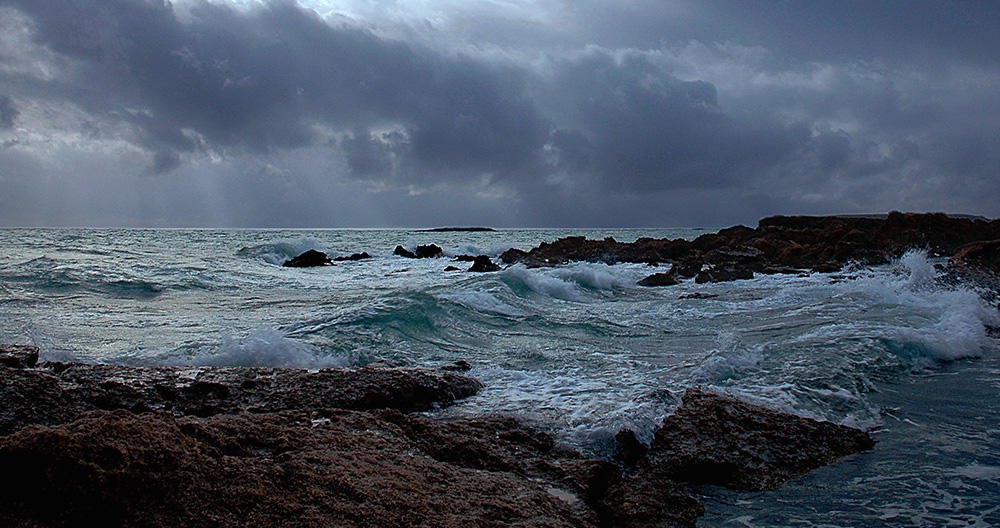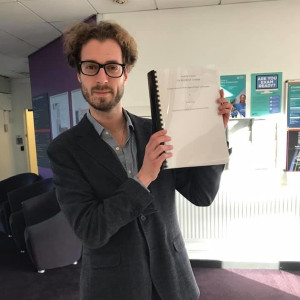Chapters
"Just look around you, Ellen! We're in the seventh circle of H...!" - so proclaimed Clark Griswold in Christmas Vacation, an American holiday season classic. He was looking around at his house destroyed. Doors off the hinges, furniture laying around, the Christmas tree a smouldering ruin... Recovery just seems impossible. Does all that say anything about the times we're living in?
The climate emergency is, by far, our most urgent concern. Thanks to climate change, we're tortured with heat waves, battered by storms and, right now, facing an unusually harsh winter. That, as war rages in Ukraine and the war's instigator, refuses to negotiate on his gas reserves. And then, inflation. Who can afford to eat, these days? Let alone any heat? All this, as governments around the world flounder.
Storm on the island, indeed! We thought we were prepared. But as Seamus Heaney writes, there is no shelter. The battering will continue. The outcome is uncertain. Charlotte Mew expressed the same in The Farmer's Bride.
There's just one trouble with that assertion: he wrote it in 1966. Long before anyone was talking about climate change. At a time when the world was relatively at peace. When pandemics were things we read about in history books. Yet this nearly 60-year-old poem describes the current moment perfectly:
- the poem discusses a calamity he thought he was prepared for
- the author talks about his powerlessness in the face of the storm
- the language is stark and undramatic, written in iambic pentameter
- there is no formal rhyming scheme
- the narrator drives the story forward with enjambments
- this work shows the narrator's progression from blasé to uncertainty in just four verses
That's all a bit of us, isn't it? We're rather buffeted by circumstances right now, just trying to make it through the storm. Our language is (increasingly) straightforward; nobody has the time or patience to search for le mot juste. We keep our narrative moving with social media updates and judiciously-timed cliffhangers. And we're growing increasingly worried. How did Heaney know, so long ago, to write precisely these words?

Context: Seamus Heaney Biography
Our poet was born at home, in a farmhouse known as Mossbawn, in 1939. This homestead lies between the towns of Castledawson and Toomebridge in Northern Ireland. He was the firstborn in a family that would grow to include nine children. When he was 14, the family relocated to Bellaghy, just a few miles away.
There was a bit of tension in the family home. His ma came from industrialised Ulster stock, his da from strong Gaelic rural tradition. It didn't seem to affect our writer too badly, though. By all accounts, he enjoyed a happy childhood, save for when his four-year-old brother died. Seamus was just 14 years old at the time, and away at school. The tragedy shook him badly, as noted by the poignant verse he penned as a tribute.

Overview: Storm on the Island
The blunt style he used to discuss his brother's death is found again in this work. At first reading, it appears to be about a storm lashing an island abode. A raging weather phenomenon that the home's inhabitants have no recourse but to wait out. In fact, this work is political in nature.
Note that the first eight letters spell Stormont - the headquarters of the Northern Ireland Office. That is why the title features no article. It's not 'The Storm on the Island' or 'A Storm...', which might have pointed to a specific, vicious weather event. Also, 'island' and 'Ireland' are homophones. We may accept that this title suggests a tribute to Stormont in Ireland but it's more likely that it acknowledges the upcoming Troubles.
Granted, the poem was published a couple of years ahead of that terrible time. However, the conflict didn't spring forth from thin air. Long before it erupted, there were signs of what would come. For as mild as it seems, in no way was Storm written in Neutral Tones.
Seamus Heaney seldom wrote about political matters in direct terms. He is a master of the oblique; his writing style compels a deep analysis. Still, it could be taken at face value, as a dramatic monologue from the perspective of a villager on a remote island. Maybe in the Irish Atlantic, considering his heritage. However, it would be double-entendre to say it's about the storms his community face and their effects.
Storm on the Island by Seamus Heaney
We are prepared: we build our houses squat,
Sink walls in rock and roof them with good slate.
This wizened earth has never troubled us
With hay, so, as you see, there are no stacks
Or stooks that can be lost. Nor are there trees
Which might prove company when it blows full
Blast: you know what I mean - leaves and branches
Can raise a tragic chorus in a gale
So that you listen to the thing you fear
Forgetting that it pummels your house too.
But there are no trees, no natural shelter.
You might think that the sea is company,
Exploding comfortably down on the cliffs
But no: when it begins, the flung spray hits
The very windows, spits like a tame cat
Turned savage. We just sit tight while wind dives
And strafes invisibly. Space is a salvo,
We are bombarded with the empty air.
Strange, it is a huge nothing that we fear.

Storm on the Island Analysis
The title is deceptively simple. It has no article - no 'a' or 'the' to begin the title. On one hand, Heaney makes his description even simpler, generalising that the Storm in question could describe any storm on any island.
However, we realise that this is a clever linguistic game. One in which the absent article plays a significant role. If we appreciate this work through a political lens, even the title takes on a new, tragic meaning. It hints at the type of storm that calls for Bayonet Charges and other types of violence.
Form
The poem is written in unrhymed iambic pentameter - free verse. The lines are usually enjambed - the sentences do not stop with the lines. But occasionally, a line contains a full sentence, as the last line does. This gives a strong indication of reaching the end of the speaker's pondering.
Enjambing a single, monosyllabic word like 'full | Blast' makes the most of this overlapping pattern. It adds stress to the words placed first in the line against the generally rising rhythm of the whole piece. Finally, despite the growing evidence that something ferocious is on the way, the writer does not demonstrate it by altering the form.
Tone
Heaney really uses the full range of consonance, assonance, alliteration and other sound patterns in the poem. Consonance represents a repeated consonant sounds within words (stacks and stooks). By contrast, assonances are repeated vowel sounds within words, as in 'mean' and 'leaves'.
This helps create a noisy recreation of the wind and rain thrashing the bare island. Or of distant, angry shouts - to take the political view. The 'comfortable' explosions of waves echo on the 'cliffs': the hard 'c' sound provides the sound of the attacking wave. Or an attack from a formerly trusted neighbour.
The final 's' on 'cliffs' echoes the hiss as the wave retreats over the stones (or the sharp intake of breath over some insult). Later when the water is flying, the spray 'hits' the windows and an internal rhyme with 'spits' repeats this harsh contact. Politically speaking: later, when mortars flew...
The poem ends with open, empty sounds, including a half-rhyme between 'air' and 'fear'. But read the poem in an Irish accent and you might be rewarded with a final full rhyme to close off the verse. Conversely, the empty-air bombardment stands for equally empty rhetoric either side engaged in.

Voice
Storm on the Island begins with the resolute determination of someone sure about himself and his people. The very simplicity of the sentence 'We are prepared' speaks of confidence. There is also a self-deprecating humour in the phrase 'This wizened earth has never troubled us | With hay', giving the impression that the speaker is glad not to have the bother of having to clean up anything.
We know that, in the runup to The Troubles, people were taking stock of their situation. Did they have enough food laid in? Was their house away from areas of conflict? The resolute determination might have echoed less-than-certain self-assurance. "We'll be fine." or in today's vernacular "Not in my backyard (NIMBY)".
In a way, the pride of the speaker for the earth beneath his feet - his island - is the opposite of the 'huge nothing' that he says they fear. The speaker has a friendly tone, reminiscent of Browning's monologue 'Fra Lippo Lippi', particularly in the phrases 'you know what I mean' and 'You might think'.
In fact, pride - in history and heritage, lie at the root of The Troubles. The ultra-Nationalistic faction wanted to remain bound to the United Kingdom despite the tragic events that time brought to pass. The opposite side wanted Northern Ireland to cede from the UK; to present a united constituency together with Ireland.
Imagery
The speaker compares the sea to a cat (fickle and liable to seem friendly, then scratch!). The wind is assigned as an attacking aircraft ('while the wind dives | And strafes invisibly'). These comparisons have different effects. On the one hand, we return to the idea of a community defending itself, as in the first lines, against an invader. Or a neighbour.
On the other hand, there is a familiar, comfortable undercurrent of knowing the sea like a pet - even an unpredictable one. It seems that life on an island produces people who can think of something in two ways at once without worrying about contradictions.
Attitude
The speaker moves between confidence (at the start of the poem), awe and a touch of humour. And then, to admissions of fear. Finally, he expresses his resignation that whatever will happen, he's powerless to prevent it. Yet throughout he maintains a calm tone, sure of the thickness of the stone walls around him.
Perhaps that, rather than the storm itself, is what Heaney really wants to focus on. Within the same poem, he expresses the self-confidence of this island's people when faced with challenges. Whether that challenge is a political storm or a weather phenomenon.
Themes in Storm on the Island
This poem's dual nature notwithstanding, the themes remain the same. There is uneasy confidence to start with, and full acknowledgement that the storm could be very bad indeed. However, the walls are strong and there are no trees to cause debris or flying particles. Nor will there be any cleanup from scattered chaff.
Listing the situation's positives doesn't detract from the fact that, when the real trouble starts, there may be no shelter. Uncertainty causes the author to question everyone and everything, even the formerly tame 'cat' that might now scratch and bite. The distant sea - perhaps a metaphor for England? - offers no protection. Once the storm grows to a full rage, those waters, too, will cast their far-flung spray upon our windows.
Finally, resignation. This storm - whichever kind it may be, will pass, as all things do. The sense of inevitability this verse closes with tells us nothing about the writer's personal feelings on the matter. It is a perfect reflection of human nature in the face of catastrophe, whether man-made or nature-driven. After all, our ability to endure is innate. Just ask Robert Minhinnick.

Summary
It's delightful to run across a piece of writing that so clearly intends to be dual - in nature and meaning. We don't mean one so contradictory as Love's Philosophy; that's a duality of a different type. This is a poem that decisively discusses so ordinary a feature of life while warning about something extraordinary. Storm is pastoral and political, all at the same time.
At first reading, one imagines a hardy rural type who is used to battening down the hatches against inclement weather. He takes stock of his assets. The protections he has and the lack of detritus-leaving features on his land, like trees and haystacks.
However, a second review shows a population - denoted by 'we', who are slightly worried about what's to come. They soon discount what might be considered friendly and protective. They warn themselves that even the formerly affectionate cat might bite and scratch.
The poem is written in the first person and in the present tense. This lends a sense of urgency to the narrative, as though this lone voice needs people to know they must fortify their surroundings. But it actually reflects a lone voice who is aware of the storm ahead. The voice of a man who knows it's just him against the elements - climatic and political.
Storm is presented either as one stanza of 19 lines or three stanzas of five lines and the fourth verse with just four lines. It is written in iambic pentameter to give it continuity and pace. Enjambment keeps the narrative constant.
The entire poem is a metaphor. Atop, we anticipate a vicious storm. Beneath, we know the storm will cause strife and cost lives. Besides that overall effect, Seamus Heaney implies storms happen regularly, whether man-made or natural. Thus, one must always be prepared. Other metaphors include sea spray hitting the windows 'like a spitting cat'. The wind becomes a thing alive, diving and strafing.
He uses consonance and assonance to achieve a rhyming effect despite it being written in free verse. He makes good use of internal rhyme to further enhance the work's lyrical effect. Unstructured as it is, we feel as though we're treated to an inner look at one man's thoughts as they develop.
Seamus Heaney obviously had a gift for taking something as dramatic as brewing political conflict and framing it as a commonly experienced happening. As with Carol Ann Duffy's Medusa, we think we're reading about something well-known when the work points to something with quite a different meaning.
He might have grown into that dual nature at home. Remember that his mother came from the Ulster people and his father sided with the Irish Nationalists. This caused tension - again, not in his household, but perhaps while they were out and about. It's easy to imagine one or the other being berated for even neutrality. Surely, young Seamus' parents discussed these issues at home.
















cool feedback
made me understand the reading thx this helped :)